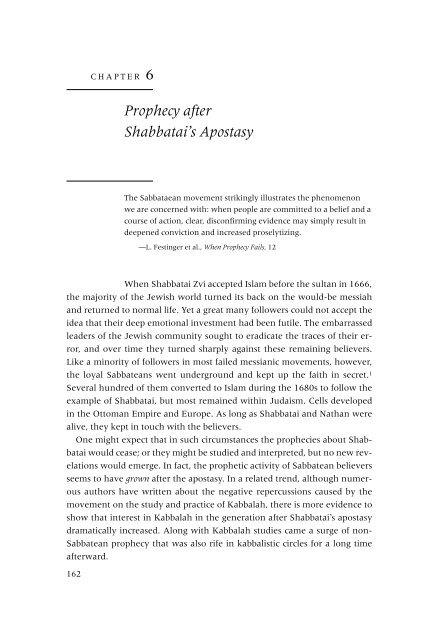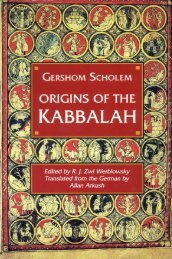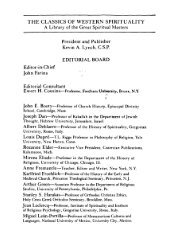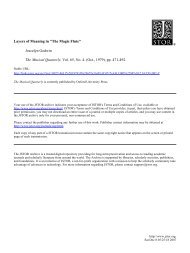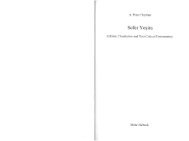You also want an ePaper? Increase the reach of your titles
YUMPU automatically turns print PDFs into web optimized ePapers that Google loves.
CHAPTER 6<br />
Prophecy after<br />
Shabbatai’s Apostasy<br />
<strong>The</strong> Sabbataean movement strikingly illustrates the phenomenon<br />
we are concerned with: when people are committed to a belief and a<br />
course of action, clear, disconfirming evidence may simply result in<br />
deepened conviction and increased proselytizing.<br />
—L. Festinger et al., When Prophecy Fails, 12<br />
When Shabbatai Zvi accepted Islam before the sultan in 1666,<br />
the majority of the Jewish world turned its back on the would-be messiah<br />
and returned to normal life. Yet a great many followers could not accept the<br />
idea that their deep emotional investment had been futile. <strong>The</strong> embarrassed<br />
leaders of the Jewish community sought to eradicate the traces of their error,<br />
and over time they turned sharply against these remaining believers.<br />
Like a minority of followers in most failed messianic movements, however,<br />
the loyal <strong>Sabbatean</strong>s went underground and kept up the faith in secret. 1<br />
Several hundred of them converted to Islam during the 1680s to follow the<br />
example of Shabbatai, but most remained within Judaism. Cells developed<br />
in the Ottoman Empire and Europe. As long as Shabbatai and Nathan were<br />
alive, they kept in touch with the believers.<br />
One might expect that in such circumstances the prophecies about Shabbatai<br />
would cease; or they might be studied and interpreted, but no new revelations<br />
would emerge. In fact, the prophetic activity of <strong>Sabbatean</strong> believers<br />
seems to have grown after the apostasy. In a related trend, although numerous<br />
authors have written about the negative repercussions caused by the<br />
movement on the study and practice of Kabbalah, there is more evidence to<br />
show that interest in Kabbalah in the generation after Shabbatai’s apostasy<br />
dramatically increased. Along with Kabbalah studies came a surge of non-<br />
<strong>Sabbatean</strong> prophecy that was also rife in kabbalistic circles for a long time<br />
afterward.<br />
162


